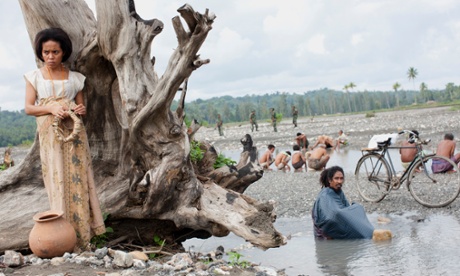
East Timor has never made a film, never told its story or seen the faces of its people on the silver screen — until this year. Beatriz’s War, billed as the young nation’s “first feature film”, opens in Melbourne on 10 July after a blockbuster season at home.
It is the product of a group from Dili with only a few years’ experience making short films. While a volunteer Australian crew, including Melbourne director Luigi Acquisto and producer Stella Zammataro, provided training and technical assistance, it remains a thoroughly Timorese export.
Dili producer Lurdes Pires will join Acquisto in answering questions at the Melbourne debut. She estimates that the film has been seen by more than 100,000 Timorese, or about one in 12 people. “Even in the small towns, we would have more than 2,000 at a screening,” she says. “Then the next night 2,000 people would come, and when the film finished they wanted us to restart the projector and show it again straight away.”
The film is a love story, spun around historic events in East Timor’s occupation by Indonesia. Beatriz’s husband, Tomas, goes missing during the massacre at Kraras by occupying forces. He reappears 16 years later, after East Timor wins independence, a tougher, more confident man. Despite longing to bury her grief, Beatriz is racked by her sense that the “new” Tomas is an imposter and a war criminal.
Acquisto says calls for encore screenings reflect, in part, how faithfully the film depicts life under Indonesia. Audiences “seemed to forget what they were watching was a film, reacting as if it was happening to them all over again”.
In late 2011, I travelled to Dili with Acquisto to watch the first week of filming and met dozens of actors and extras who invoked their trauma as part of their performance. These included three men who, buried under bodies, had survived the Kraras massacre, and were now playing victims in the massacre scene.
Director Bety Reis, who worked closely with Acquisto, was 16 when East Timor voted for independence in 1999. During the Indonesian retaliation that followed, she was made to kneel and was to be executed. “I’m grateful that I was spared ... I was able to make this film, and to share it with my people,” she told me.
Reis and Pires were often called to embrace overwhelmed actors, even as they broke down. And at around midnight each night, the power would fail. Then, as the back-up generator kicked in, cheers from downstairs as editing equipment and computers restarted.
Frequent rain meant crew members happily doubled as “umbrella holders”, prompting Acquisto to observe “if this were a normal Australian crew, they’d be a lot shittier”. At times the set was full of laughter, with puns and running jokes aplenty.
Indeed, despite significant obstacles and a limited budget (provided mainly by Australian investors), the film’s success is a testament to the Dili team’s patience, positivity and resourcefulness.
After a remarkable five-week run in East Timor’s only cinema, a duplex in a Dili mall, Reis, Pires and other cast members toured the country, showing the film using a diesel-powered projector and an inflatable screen.
Pires says that in workshops held after the film, viewers were buoyed by Beatriz’s quest for truth and justice. As a metaphor for the way the country is dealing with its past, it goes against the grain of the official policy of “friendship and forgiveness”.
“I think everyone in the general community wants justice in relation to their past, even if it is painful,” says Acquisto.
The final film is a riveting tale, told simply and with real emotion. It is also a chronicle of important historic events in the region, with the Indonesian elections giving it a new currency. Prabowo Subianto, the army general alleged to have ordered the massacre in Kraras, along with hundreds of other war crimes in East Timor is possibly Indonesia's next president.
- Beatriz’s War (A Guerra da Beatriz) is at Melbourne’s Cinema Nova until 14 July, then in limited release in cinemas across Australia.

